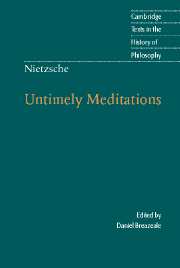Book contents
- Frontmatter
- Contents
- Introduction
- Chronology
- Further reading
- Note on the text
- Untimely Meditations
- David Strauss, the Confessor and the Writer
- On the Uses and Disadvantages of History for Life
- Schopenhauer as Educator
- Richard Wagner in Bayreuth
- Glossary of names
- Notes
- Index
- Cambridge texts in the history of philosophy
Richard Wagner in Bayreuth
Published online by Cambridge University Press: 05 June 2012
- Frontmatter
- Contents
- Introduction
- Chronology
- Further reading
- Note on the text
- Untimely Meditations
- David Strauss, the Confessor and the Writer
- On the Uses and Disadvantages of History for Life
- Schopenhauer as Educator
- Richard Wagner in Bayreuth
- Glossary of names
- Notes
- Index
- Cambridge texts in the history of philosophy
Summary
For an event to possess greatness two things must come together: greatness of spirit in those who accomplish it and greatness of spirit in those who experience it. No event possesses greatness in itself, though it involve the disappearance of whole constellations, the destruction of entire peoples, the foundation of vast states or the prosecution of wars involving tremendous forces and tremendous losses: the breath of history has blown away many things of that kind as though they were flakes of snow. It can also happen that a man of force accomplishes a deed which strikes a reef and sinks from sight having produced no impression; a brief, sharp echo, and all is over. History has virtually nothing to report about such as it were truncated and neutralized events. And so whenever we see an event approaching we are overcome with the fear that those who will experience it will be unworthy of it. Whenever one acts, in small things as in great, one always has in view this correspondence between deed and receptivity; and he who gives must see to it that he finds recipients adequate to the meaning of his gift. This is why even the individual deed of a man great in himself lacks greatness if it is brief and without resonance or effect; for at the moment he performed it he must have been in error as to its necessity at precisely that time: he failed to take correct aim and chance became master over him – whereas to be great and to possess a clear grasp of necessity have always belonged strictly together.
- Type
- Chapter
- Information
- Nietzsche: Untimely Meditations , pp. 195 - 254Publisher: Cambridge University PressPrint publication year: 1997
- 11
- Cited by

